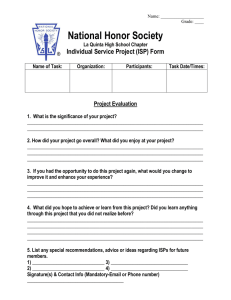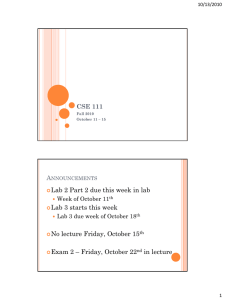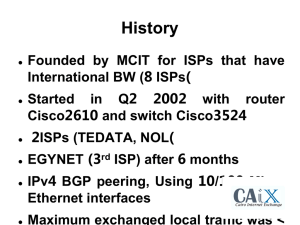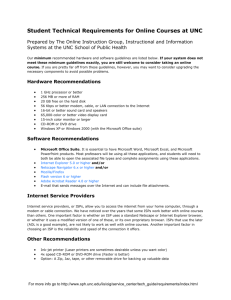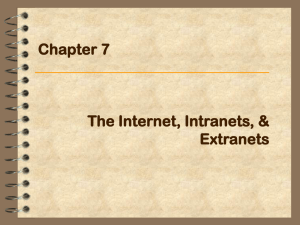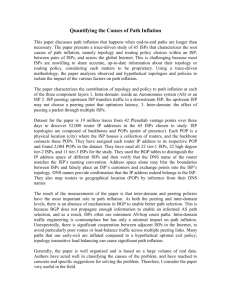Open access or Making money openly David D. Clark
advertisement
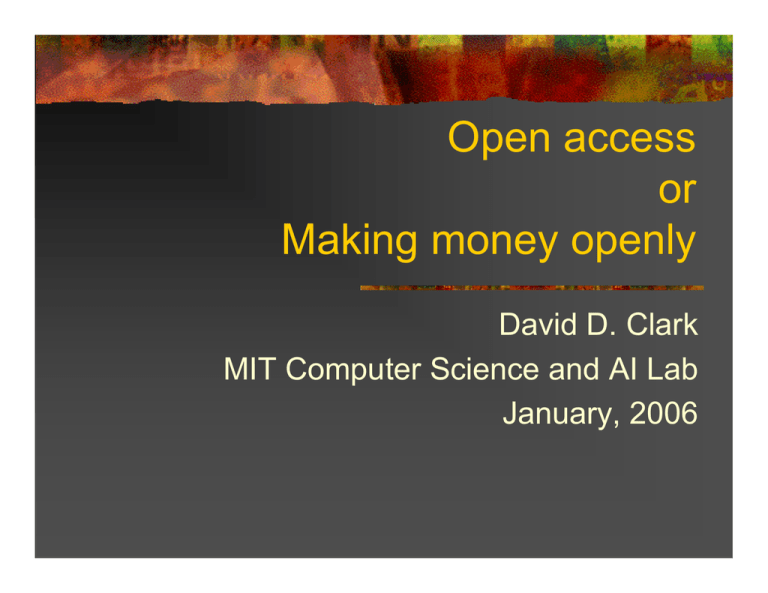
Open access or Making money openly David D. Clark MIT Computer Science and AI Lab January, 2006 Topic? This talk is about: The current debate over open access and network neutrality Proposals to rewrite the Telecoms act How ISPs make money An architecture for a future Internet. Some thoughts… "Those who cannot remember the past are destined to repeat it." George Santayana “You cannot step twice into the same river.” Heraclitus “Generals always prepare to fight the last war.” Lots of folks Network neutrality Do we know what it means? No Can we fight over it anyway? Yes It might mean: Blocking some content. Discriminatory use of QoS. Charging some providers. Lets get there indirectly. Lets use another word with no defined meaning. Open: what does that mean? “Open” is code for several things. Open to third party innovation. Open to user choice and the discipline of competition. Open to equal access to content. There are theories that one sort of openness will protect another. “Open” is also code for “weak incentive to invest” (in some circles). Again, lots of theory (and posturing) here. Look at reality today Do ISPs block “things”, and why? Are there barriers to investment, and what does openness have to do with it? How is the landscape shifting, and can we move to a better outcome? ISPs certainly block things Block applications that are security risks. Block servers in the home . For capacity reasons To stratify market. Block modes of certain applications. What server can you use to send email? Again, is this security or stratification? They (try to) block to protect revenues in applications. They block traffic to control costs. Some thoughts There is “good” blocking, and “bad” blocking. We could disagree on the criteria for “bad”. Most ISPs are not monopolists. So: A duopoly is not good enough. There is not enough consumer concern to discipline these classes of activity. Why pick AOL? Lots of economic theory here. Digression--making money Specific focus on consumer broadband. Today: fixed pricing. $40/month (or so) independent of usage. This creates cost pressures and perverse incentives. New applications ¿ higher usage ¿ higher cost, but constant revenues, so lower profits. Why would an ISP love a new app? Some rough estimates Of that $40/month, $2 might be for usage. Heavy users may generate 10x the traffic of average users. So a heavy user may cost an ISP ~ $20/month. Solution: block heavy users! These usage costs are for wide area traffic. This behavior is a barrier to some innovation. Death of distance--not Distance did not die. It is not even badly injured. It is only sleeping. For some content (such as IPTV) current costs do not permit large-scale wide area transport. Content will “have to be” staged locally. Then costs go to zero. Raises new forms of blocking: Logical or physical co-location (hosting). Three futures Bad future 1: rising costs ¿ blocking of new apps ¿ reduced innovation ¿ stagnation of the value proposition ¿ no growth. Bad future 1a: Vertical reintegration ¿ restricted innovation ¿ etc. Bad future 2: open access ¿ commoditization of ISP ¿ no facilities investment ¿ stagnation in capacity ¿ no growth. Good future: avoid both those fates. Make money from apps ISP does not own. How might that happen? Sell enhanced network-level services such as enhanced QoS. Is this better than vertical integration with apps? Find a new pricing model for packet carriage. Usage tiers? Weekend splurge pricing? Sell applications that are “naturally” local. Backup Sell application-support services. Caching, security. Actively open. Barriers to being actively open Application design: Design to benefit from services Design to avoid monopoly. Indirect sources of revenue: Consumers don’t usually pay today Coordination problems to offer the service platform. Architecture, revenue sharing, performance Who let Akamai in? Akamai is a third-party provider of content distribution. Global set of managed Web caches. Proprietary methods to improve performance Service commitments. Akamai monetized what ISPs were doing for free. Identified the content producer as customer. One stop shopping. Illustrates barriers for ISP entry. Coordination, indirect source of revenue. Good or bad? Bad: ISPs could not exploit opportunity, left revenues on table. Dive to commodity packet carriage. Good: Akamai moves money across the Internet. Jumps peering points (revenue neutral boundaries). ISPs get (or save) money, without having to solve coordination problems. More general point--overlays Akamai is an example of an overlay network. Collection of servers provided in organized way to support applications. Lots of other examples: routing, security. Overlays change the layering model of the Internet. What goes where; who does what. The layering model becomes more fluid. Overlays challenge our understanding of industry structure and regulation. We tend to associate layers with industry sectors. We tend to associate policy with layers and sectors. Other possible questions: Who let Google in? Who let iPass in? Each of these is a revenue opportunity that the ISPs missed. Important to understand why. Who can lend them a hand…? A notable symptom The industry structure of “the Internet” evolves fast. CDNs Streaming Games ISPs seem to evolve much slower? Why? Must history repeat itself? What did regulators get wrong last time? Assumption about industry structure. Healthy long distance competition. Barriers to facilities-based local loop. Last time a “horizontal” error. This time, let’s not make a “vertical” error. Don’t assume the layers have fixed roles. Questions (?) for the future Will we worry about vertical integration between ISPs and overlay services? Will we worry about the openness of overlays? Will we worry if Akamai gains monopoly status? Will we worry if Google or Microsoft buys Akamai? Should we worry about Google? Questions (naïve) for policy Little evidence so far that forcing open interfaces at one layer will induce open interfaces at an another layer. What is known about this situation? Is the “openness” debate better framed as protection of societal needs or preservation of competition? What is special here? Who can help the ISPs? Open research. Academia and neutral funding creates a special opportunity. FIND calls for work at this level. Cisco. To Cisco, ISP is a customer. To most, ISP is an enemy. And why should Cisco care? Akamai and Google do not buy from Cisco… Review: our goal should be Encourage an industry structure in which: There is adequate continuing investment in infrastructure. There is sufficient openness to encourage innovation. Users have adequate choice and there is competitive discipline. ISPs are a part of the system, not a external supplier.
